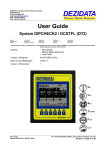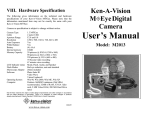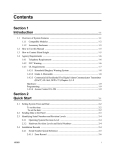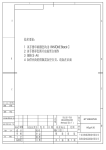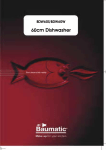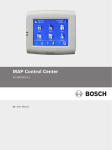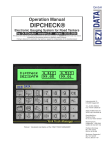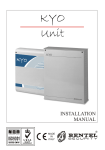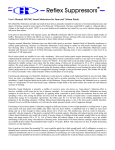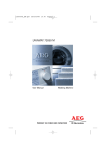Download User Guide - Dezidata TVE GmbH
Transcript
DEZIDATA Transport Vehicle Equipment GmbH Industriestr.10 D-94469 Deggendorf http://www.dezidata-tve.de FON: +49-991-29090-0 FAX: +49-991-29090-29 User Guide System DIPCHECK2 / DCSTFL [00]DIP [01]PROFILES [02]FTL [03]FTLOM [04]PIDLD [05]SPLITMANIF [06]UNLDIR+MANIF [08]MANIF [09]FLOWM [10]FLUSH [11]SELFLD [12]PRINT [13]INCL [14]PIDUNL [15]OFPUNL [16]VRUNL This document as well as all ideas therein are the intellectual property of the company DEZIDATA TVE GmbH and must not be disclosed to third parties without our express written consent! Authors: • Nico Decker • Manolo Müller-Menendez • Justin Wolf Version of Program: DCSTFUSR V2.45 Date of Last Modification: 12.09.13 Version of Document: 1 DIP COP SEAL TRACKING FLOW LINK User Guide System DIPCHECK2 / DCSTFL File: BA_DIPCHECK2_DCSTFL_English_Complete_v01.odm Version 1 / Page 1 of 36 DEZIDATA Transport Vehicle Equipment GmbH Industriestr.10 D-94469 Deggendorf http://www.dezidata-tve.de FON: +49-991-29090-0 FAX: +49-991-29090-29 Table of Contents 1 1.1 1.2 1.3 1.3.1 1.3.2 1.3.3 Initial State and General Notes...........................................................................................3 Averaging / Gauging (Dipstick)...........................................................................................5 Selection of Profile.............................................................................................................. 5 Connection to an On-Board-Computer...............................................................................5 Signaling a Running Communication..................................................................................5 Order Management............................................................................................................ 6 Initial State and Further Dialogues After Accepting an Order.............................................6 2 2.1 2.2 2.3 Loading............................................................................................................................... 7 Control................................................................................................................................ 8 Switching Products............................................................................................................. 9 Loading with Product Identification.....................................................................................9 3 3.1 3.2 3.3 3.4 3.5 Direct Delivery by Gravity.................................................................................................10 Control.............................................................................................................................. 11 Compartment Details........................................................................................................12 Emptying Compartments..................................................................................................14 Split Manifold.................................................................................................................... 15 Direct Delivery with Possibility of Simultaneous Delivery via Manifold..............................15 4 4.1 4.2 4.3 4.4 4.5 Delivery via Manifold (by Pump or Gravity).......................................................................16 Introducing Dialogues.......................................................................................................17 Controlling the Delivery via Manifold.................................................................................18 Display and Draining of Manifold......................................................................................19 Dipstick Delivery via Manifold...........................................................................................21 Flow Meter........................................................................................................................ 22 5 5.1 5.2 Flushing the Wet Hose.....................................................................................................23 Flushing into the Customer's Tank...................................................................................23 Flushing Back into the Vehicle..........................................................................................25 6 Selfloading (Manifold).......................................................................................................27 7 Printing............................................................................................................................. 28 8 8.1 8.2 8.3 8.4 8.5 8.6 8.7 Description of Possible Warnings, Errors, Their Reasons and Bypasses.........................30 Password Dialogues......................................................................................................... 30 Error in Metrological Parameters......................................................................................30 Manifold not Empty Before or After Dipstick Delivery.......................................................31 Warnings Before and After a Transaction........................................................................31 Bypasses During or When Starting a Delivery..................................................................33 System Errors During a Transaction.................................................................................35 Other Errors...................................................................................................................... 36 User Guide System DIPCHECK2 / DCSTFL File: BA_DIPCHECK2_DCSTFL_English_Complete_v01.odm Version 1 / Page 2 of 36 DEZIDATA Transport Vehicle Equipment GmbH Industriestr.10 D-94469 Deggendorf http://www.dezidata-tve.de FON: +49-991-29090-0 FAX: +49-991-29090-29 1 Initial State and General Notes After switching on the system the following screen appears, the “Initial State”. Depending on the vehicle the number of compartments and/or the visible keys may vary. Compartment number Loaded product Loaded voume Status of pipework Graphical filling level Inclination Further status information Date/Time Functions assigned to hardware keys Hardware keys on DEZITOUCH In the Initial State each compartment will be displayed including • Compartment number and product (line 1) • Volume in compartment (in liters) or respectively terms like REST or EMPTY (line 2) • Filling level, graphically displayed (black part of the compartment) • Status of valve between compartment and pipework • Status of pipework (black, if full) The display DEZITOUCH reacts on touches onto the screen. For operating the system virtual keys, numeric and alphanumeric keyboards can be used on the touchscreen. The texts in the lowest line on the screen are describing the functions corresponding to the hardware keys directly below. Either touch on the description or press the related hardware key. In the Initial State the following functions are avail: • „Load“: Loading of compartments (see page 7) • „Unload“: Direct delivery (by gravity) on right or left (see page 10) • „PumpUn“: Delivery via manifold (wet or dry hose) (see page 16) User Guide System DIPCHECK2 / DCSTFL File: BA_DIPCHECK2_DCSTFL_English_Complete_v01.odm Version 1 / Page 3 of 36 DEZIDATA Transport Vehicle Equipment GmbH Industriestr.10 D-94469 Deggendorf http://www.dezidata-tve.de FON: +49-991-29090-0 FAX: +49-991-29090-29 • „SelfLo“: Self-loading (loading via manifold) (see page 27) • „Print“: Print menu with possibility to print documents (see page 28) • „MORE..“: By pressing this key the keys in the lowest line will change (see picture below on right). During normal operation these additional keys are not required and are therefore not part of this user guide. On a vehicle with two displays only one is active at a time. The currently inactive display become active by pressing any hardware key on it. The switching process may require a couple of seconds. It is not possible to empty compartments in any inclination. In order to drain a compartment completely the inclination has to reside within certain limits given by its construction. The system shows the current inclination in the bottom left corner for further examination. The number in front of the slash shows the inclination in direction of driving (positive value for when back side is lower than the front), the number after the slash shows the inclination transverse to the direction of driving (positive for when left side is lower than right side). When the system displays e.g. “0.14 / -0.28”, it means that the container is inclined 0.14° to the back and 0.28° to the right. 1.1 Averaging / Gauging (Dipstick) Before and after any unloading, possibly loading or self-loading the system requires averaged filling levels. When the gauging process is not finished at a given time the averaging process will be shown on the screen (see picture on right). For each compartment the system shows the number of measurements taken while its filling level was stable enough, followed by one of the characters • „!“, if further measurements are required yet, or • „*“, if the averaging process is finished. As soon as all compartments are followed by “*” the system automatically moves on to the previously selected transaction mode (e.g. unloading). Depending on the vehicle's configuration and equipment a further gauging procedure might follow for the SPD+-Test. Furthermore, when the operator desires the system can be configured • to omit precise gauging for loading and self-loading or • to additionally show the key “UNMEAS” (unmeasured) for bypassing the precise gauging procedure (measurement usually metrologically inexact). User Guide System DIPCHECK2 / DCSTFL File: BA_DIPCHECK2_DCSTFL_English_Complete_v01.odm Version 1 / Page 4 of 36 DEZIDATA Transport Vehicle Equipment GmbH Industriestr.10 D-94469 Deggendorf http://www.dezidata-tve.de FON: +49-991-29090-0 FAX: +49-991-29090-29 1.2 Selection of Profile If the feature “order profiles” is configured and activated, the system presents a selection dialogue before loading, presuming all compartments are empty. In this dialogue one of the displayed profiles can be selected. One profile can hold • a product list including product names, • settings for cross-over-prevention (COP), • settings for the format of a delivery note and • a lot more configuration settings. Therefore it is possible to deliver products for several mineral oil companies. The driver has to switch profiles, whereas it is usually impossible to switch, if the vehicle is loaded. 1.3 Connection to an On-Board-Computer 1.3.1 Signaling a Running Communication If an On-Board-Computer (OBC) is connected to the system, which is communicating via protocol FTL (Fuel-Truck-Link according to Standard EN 15969-1), the text “FTL-conn.” will be displayed in the right bottom corner of the display. The text may stay visible for about 40 seconds after the communication stopped. Note: Depending on the active system status the text may disappear shortly even during regular communication. This is not necessarily an error. User Guide System DIPCHECK2 / DCSTFL File: BA_DIPCHECK2_DCSTFL_English_Complete_v01.odm Version 1 / Page 5 of 36 DEZIDATA Transport Vehicle Equipment GmbH Industriestr.10 D-94469 Deggendorf http://www.dezidata-tve.de FON: +49-991-29090-0 FAX: +49-991-29090-29 1.3.2 Order Management When the system receives an order from the OBC, it will be shown immediately after. Depending on the type of the order “Load” (loading order) or “Unload” (unloading order) is displayed. An order may optionally contain compartment numbers, the product to be loaded and the quantity to be loaded/unloaded. The driver may accept the order by pressing “OK” or reject it by pressing “REJECT”. A rejected plan is a so called “frustrated delivery/loading”, which means that no quantities will be returned to the OBC. 1.3.3 Initial State and Further Dialogues After Accepting an Order After accepting the order the system shows the Initial State again with the difference that “Got Order!” is displayed in the left bottom corner of the screen. This text disappears after finishing the order. The system warns the driver, if he tries to start a transaction contradicting the received order (e.g. driver presses on button “Load”, however, unloading was ordered). The status text “Got Order!” in the left bottom corner of the screen also stays during the transaction. User Guide System DIPCHECK2 / DCSTFL File: BA_DIPCHECK2_DCSTFL_English_Complete_v01.odm Version 1 / Page 6 of 36 DEZIDATA Transport Vehicle Equipment GmbH Industriestr.10 D-94469 Deggendorf http://www.dezidata-tve.de FON: +49-991-29090-0 FAX: +49-991-29090-29 Orders for delivery possibly have to be split into direct delivery and deliveries via manifold. Therefore it might be necessary to confirm that the order is finished after finishing a transaction. Optionally it is possible to select continuation of the order in the dialogue. The keys in the dialogue have the following meaning: • “GRAVIT” (direct delivery by gravity): As next part of the order a direct delivery will be initiated. • “MANIF.”: A delivery via manifold will be initiated. • “FINISH”: All quantities delivered as part of the current order will be returned to the OBC for further processing. The order is assumed to be complete, and the system returns into Initial State. Note: Direct delivery can only be selected once as part of an order. In contrast it is of course possible to perform more than one delivery via manifold per order. As long as not all order items have been fulfilled when trying to exit a transaction the system detects this and shows a warning: “Not fulfilled all orders?” There are two options avail: • „BACK“: The system returns into transaction mode so that it is possible to continue and complete further order items. • „IGNORE“: Order items, which are not fulfilled yet should be completed in a succeeding transaction (e.g. in a delivery via manifold). 2 Loading For each compartment the following details will be displayed: User Guide System DIPCHECK2 / DCSTFL File: BA_DIPCHECK2_DCSTFL_English_Complete_v01.odm Version 1 / Page 7 of 36 DEZIDATA Transport Vehicle Equipment GmbH Industriestr.10 D-94469 Deggendorf http://www.dezidata-tve.de FON: +49-991-29090-0 FAX: +49-991-29090-29 Compartment Number Product Current Flow in Liters per Minute Loaded Volume Total Filling Volume in Compartment Graphical Display of Filling Level (black = filled) Status of Pipework (black = filled) Status of Valve Note: Bad product quality may result in a false volume display (usually indicated by REST instead of a volume). Most probable reasons are: • air bubbles in the product • water in the product • foreign particles • low temperatures and a product with insufficient additive so that it is not protected against those temperatures 2.1 Control Depending on equipment and configuration compartments may be opened manually in the following ways: • mechanically using pneumatic control blocks • using keys on the display; either • individually per compartment (keys “Cmp1”, “Cmp2” etc.) and/or • collective control of all compartments (keys “Open” and “Close”) User Guide System DIPCHECK2 / DCSTFL File: BA_DIPCHECK2_DCSTFL_English_Complete_v01.odm Version 1 / Page 8 of 36 DEZIDATA Transport Vehicle Equipment GmbH Industriestr.10 D-94469 Deggendorf http://www.dezidata-tve.de FON: +49-991-29090-0 FAX: +49-991-29090-29 2.2 Switching Products By pressing the key “END” the loading process will be finished, whereas the system automatically closes all previously opened bottom valves. Key “Prod.” allows to switch the product claimed to be in a compartment. First the number of the related compartment has to be entered, afterwards a selection dialogue appears. Switching the product might be required, if the loading arm in question did not provide any product information. It is highly recommended to always switch the displayed products as the vehicle should be loaded later – before loading and when compartments are empty. This is the so called “loading plan”. If it is tried to switch the product for a non-empty compartment, the system might show a warning and ask for a password before actually switching the product (see page 30). This depends on the configuration. 2.3 Loading with Product Identification If loading arms are equipped with a magnetic or electrical product identification (PID), the detected product will be displayed in the related compartments. Loading Arm with Product Identification Additionally compartments will open automatically on detection of a valid product, if the system is configured to do so, any rests in the compartment are of the same product or the compartment is User Guide System DIPCHECK2 / DCSTFL File: BA_DIPCHECK2_DCSTFL_English_Complete_v01.odm Version 1 / Page 9 of 36 DEZIDATA Transport Vehicle Equipment GmbH Industriestr.10 D-94469 Deggendorf http://www.dezidata-tve.de FON: +49-991-29090-0 FAX: +49-991-29090-29 empty. The operator may force a loading plan, which means that the product assignment is strictly preset. In this case even an empty compartment could not be opened, if the detected product did not match the strictly assigned product. In case of danger of mixing (product identification of loading arm contradicts a product loaded yet) the system prevents a manual opening of a compartment either. A product identification of a loading arm will be taken over as the product assigned to a previously empty compartment as soon as its empty pipework changes to “not empty”/”filled”. Attention: Irrespective of product identification installed at a loading gantry the product assigned to each compartment has to be verified after loading (in Idle State), whether it really matches the loaded product. 3 Direct Delivery by Gravity If it is possible to delivery on both sides of the vehicle, the transaction has to initiated on the related side's display. In order to initiate the direct delivery the button “Unload” has to be pressed in Initial State. Depending on the vehicle's configuration pneumatic control blocks might have to be actuated for being able to perform the transaction. In case of problems (e.g. in the pneumatics) warning and/or error messages may appear (see page 30). Compartment Number Product Delivered Volume Filling Volume in Compartment Flow in Liters per Minute Status of Pipework User Guide System DIPCHECK2 / DCSTFL Status of Valve File: BA_DIPCHECK2_DCSTFL_English_Complete_v01.odm Version 1 / Page 10 of 36 DEZIDATA Transport Vehicle Equipment GmbH Industriestr.10 D-94469 Deggendorf http://www.dezidata-tve.de FON: +49-991-29090-0 FAX: +49-991-29090-29 Compartment Number Product Delivered Volume Filling Volume in Compartment Detected Product Identification of Tank Status of Pipework 3.1 Flow in Liters per Minute Status of Valve Control If no compartment is selected, the main navigation keys are visible: • „END“: Finish unloading mode. All open compartments will be closed automatically, and the system switches back into Idle State. • „STOP!“: All active bypasses will be removed, and all compartments' valves will be closed. So called bypasses are ignored/bypassed warning messages of the system; these can be warnings of a possibly installed cross-over-prevention-system or general warnings concerning the system state. • „Cmp1“, „Cmp2“ etc.: Selects the related compartment in order to be able to perform compartment specific actions. A compartment can also be selected by touching it on the screen. After selecting a compartment an arrow marker appears to the left of the compartment number in question, and the keys in the bottom will change as shown in the picture below. User Guide System DIPCHECK2 / DCSTFL File: BA_DIPCHECK2_DCSTFL_English_Complete_v01.odm Version 1 / Page 11 of 36 DEZIDATA Transport Vehicle Equipment GmbH Industriestr.10 D-94469 Deggendorf http://www.dezidata-tve.de FON: +49-991-29090-0 FAX: +49-991-29090-29 The compartment specific keys are: • „BACK“: Return to main navigation keys. • „Stop!“: Clears all bypasses for the selected compartment and closes its valves. • „Start“: Tries to open the selected compartment. If the compartment is open, the key is replaced by „Pause“. • „Pause“: Interrupts a running delivery by closing the bottom valve, whereas possibly activated bypasses will not be removed, in contrast to button „Stop!“. This button should be used to shortly interrupt the delivery. • „Detail“: Changes forth an back between the overview over all compartments and the detailed view for the selected compartment (see the following screenshots). • „Preset“: Asks for a so called volume preset. After reaching the entered volume for the selected compartment during delivery (as to be seen in the second line of each compartment) the system interrupts the delivery proess for the compartment in question. In order to deactivate the volume preset a volume of “0” (0L) has to be entered, which is the default value. The preset will jump back to 0 immediately after a previously entered preset has been reached. Each compartment has its own volume preset. By entering a “+” in front of the volume (e.g. “+100”) the preset will be set to the currently delivered volume plus the entered value. The dipstick also can measure the density of the loaded product. Therefore it is possible to detect, if a wrong product has been assigned to a loaded compartment before it will be unloaded into a tank with another product. This means a certain degree of safety against cross-overs will be reached, even if no cross-over-prevention-system is installed. If not all conditions are met for cross-over-prevention, the system might show appropriate error messages, when trying to start a delivery (see page 33). One further key, “OFPonl”, may be visible depending on the configuration. This key allows to set a default bypass. Default bypasses are avoiding bypass dialogues, when it is desired to delivery at places, which are not equipped properly. 3.2 Compartment Details The detail screen presents all known information of a compartment. User Guide System DIPCHECK2 / DCSTFL File: BA_DIPCHECK2_DCSTFL_English_Complete_v01.odm Version 1 / Page 12 of 36 DEZIDATA Transport Vehicle Equipment GmbH Industriestr.10 D-94469 Deggendorf http://www.dezidata-tve.de FON: +49-991-29090-0 FAX: +49-991-29090-29 Selected Compartment Delivered Volume Keys for Switching to Other Compartments The Arrow Signals an Open Compartent Temperature Compensated Delivery Volume at 15°C Average Temperature in °C Assigned OverfillPrevention Detected Electrical Product Identification (PID) Vapour Recovery Coupling Flow in Liters per Minute Compartment Content in Liters, Percentage and Height Measured Density in g/L Status of OverfillPreventions Product in Compartment A Check Mark Signals an Overfill-Prevention with Status „Clearance to Fill“ or a Vapour Recovery, Which Was Not Bypassed. Exclamation Marks Signal Active Bypasses User Guide System DIPCHECK2 / DCSTFL File: BA_DIPCHECK2_DCSTFL_English_Complete_v01.odm Version 1 / Page 13 of 36 DEZIDATA Transport Vehicle Equipment GmbH Industriestr.10 D-94469 Deggendorf http://www.dezidata-tve.de FON: +49-991-29090-0 FAX: +49-991-29090-29 Selected Compartment Product in Compartment Keys for Switching to Other Compartments Delivered Volume An Arrow Signals an Open Compartment Temperature Compensated Delivery Volume at 15°C Average Temperature in °C Flow in Liters per Minute Measured Density in g/L Compartment Content in Liters, Percentage and Height Depending on the equipment of the vehicle some of the described information may not be shown (e.g. details for overfill-prevention). Note: Exclamation marks („!“ or „-!-“) signal bypasses at the place, where they are located, whereas check marks are indicators for a proper sensor signal. These symbols are only used in systems, which are not or not completely equipped with a cross-over-prevention-installation. 3.3 Emptying Compartments The system considers a compartment as empty, if the following can be seen on the display: • The pipework is shown as empty (white). • The compartment content is shown as completely white. • The text “EMPTY” replaces the rest volume. For emptying a compartment completely the following conditions have to be met: • The vehicle has to be inclined in a way that the bottom valve is the lowest point in the compartment in question. • The bottom valve has to stay open. • The pipework must be dry. • All these three conditions must be fulfilled for 30 seconds (duration may be adapted based on vehicle's configuration and design). Note: If the compartment is not empty and its filling level below 35 mm, then a precise measurement is not possible. In this case e.g. the rest volume on the delivery note will be a default minimum value, and the delivered quantity will be metrologically invalid! Before leaving unloading mode an appropriate warning message appears (see page 32). User Guide System DIPCHECK2 / DCSTFL File: BA_DIPCHECK2_DCSTFL_English_Complete_v01.odm Version 1 / Page 14 of 36 DEZIDATA Transport Vehicle Equipment GmbH Industriestr.10 D-94469 Deggendorf http://www.dezidata-tve.de FON: +49-991-29090-0 FAX: +49-991-29090-29 3.4 Split Manifold Some vehicles equipped with a manifold may have valves inside this manifold, which allow combining compartments during delivery by gravity for a delivery through one shared hose. In order to use this feature it is necessary to first select the compartment, to which the hose is connected (this compartment is called the main compartment). Additional buttons are shown in detail view. These buttons can be used to determine, which neighbor compartments to be combined with the selected main compartment, whereas the main compartment is displayed as “<” or respectively as “>”. These buttons appear, if feature „split manifold“ is avail and active. By touching one of the compartment boxes a black bar will be displayed below the numbers starting at the box marked with „<“ or „>“ (the main compartment) and ending at the box, which has been touched. It signals interconnected compartments. By opening or closing the main compartment all selected neighbor compartment will follow this command automatically. If cross-over-prevention is active, all sensor signals arriving at the main compartment will be copied to the neighbor compartments. Only those neighbor compartments will be shown, which are loaded with the same product as the main compartment. Therefore, mixing in the manifold is avoided. By pressing “<” any extension of the manifold to neighbor compartments on the left will be deactivated, by pressing “>” any extension to the right respectively. 3.5 Direct Delivery with Possibility of Simultaneous User Guide System DIPCHECK2 / DCSTFL File: BA_DIPCHECK2_DCSTFL_English_Complete_v01.odm Version 1 / Page 15 of 36 DEZIDATA Transport Vehicle Equipment GmbH Industriestr.10 D-94469 Deggendorf http://www.dezidata-tve.de FON: +49-991-29090-0 FAX: +49-991-29090-29 Delivery via Manifold Under simple conditions it is possible to open compartments for delivery through manifold in the mode for direct delivery, presuming an appropriate pneumatics. For this feature to work products are separated into manifold and direct delivery products. Manifold products can only be unloaded through the manifold, whereas direct delivery products can only be delivered directly. The delivery via manifold automatically uses the first dry hose. It is not possible to select any other, even if there are more delivery paths avail (e.g. wet hose). New button for starting or stopping the delivery via manifold Status of manifold Before operating the manifold the desire compartments should be opened. Controlling the compartments is explained on page 11. Afterwards the manifold can be opened and the delivery be started by pressing “MANIF.“. By pressing this button again the manifold delivery is stopped. While delivery via manifold is running, compartments can be closed and opened, if those actions would not lead to a mixing in the manifold. If the manifold runs empty, the manifold delivery will stop automatically after a configured period (usually 20 seconds). The current status of the manifold is displayed in the lower right corner of the screen, whereas the first characters stands for the manifold valve and the second character for its filling status. Their meaning: • „X“: Manifold valve closed • „O“: Manifold valve open • „–“: Manifold empty • „+“: Manifold partially filled • „#“: Manifold completely filled It is possible to open the manifold without opening any compartments (e.g. for emptying). If an overfill-prevention is required for the delivery, in this case the overfill-prevention has to be used, which is usually used for deliveries through the manifold or by pump. Therefore it is recommended to always use the same overfill-prevention for deliveries through manifold. 4 Delivery via Manifold (by Pump or User Guide System DIPCHECK2 / DCSTFL File: BA_DIPCHECK2_DCSTFL_English_Complete_v01.odm Version 1 / Page 16 of 36 DEZIDATA Transport Vehicle Equipment GmbH Industriestr.10 D-94469 Deggendorf http://www.dezidata-tve.de FON: +49-991-29090-0 FAX: +49-991-29090-29 Gravity) 4.1 Introducing Dialogues After pressing the button “PumpUn” in the Initial State the introducing dialogues for the delivery through manifold appear. In contrast to the button's historical name it is also possible to deliver by gravity through the manifold, depending on the vehicle's construction. In the first dialogue “Choose product” the system presents all loaded products, which are allowed to be delivered through the manifold. In case of an additive pump on board the list also contains the additivated products. By pressing the key “ABORT” the system returns into the Initial State. Note: If sucking from a trailer is possible, always all manifold products will be displayed. In the next step the “Path of delivery” has to be chosen. Depending on the vehicle's equipment the paths can be pumped wet hoses and/or dry hoses and/or dry hose by gravity. The selected path will be shown later during delivery in the right bottom corner of the screen (e.g. “DH” or “WH”). By pressing the key “ABORT” the system returns into the Initial State. Since the manifold's contents can not be measured the manifold must be empty before and after a delivery measured by dipstick. If this was not the case, the delivered quantity would not be metrologically valid and an appropriate warning message (“status of manifold unclear”) would appear. Due to this reason it is mandatory to empty the manifold after the delivery measured by dipstick. When measuring with flow meter, whereas the manifold should be emptied afterwards, it is recommended to enter a volume preset. The system will close the compartments before reaching the preset volume so that after emptying the manifold the desired volume is reached rather precisely. In order to empty a compartment the entered volume preset has to be either greater or equal than the compartment content or 0. User Guide System DIPCHECK2 / DCSTFL File: BA_DIPCHECK2_DCSTFL_English_Complete_v01.odm Version 1 / Page 17 of 36 DEZIDATA Transport Vehicle Equipment GmbH Industriestr.10 D-94469 Deggendorf http://www.dezidata-tve.de FON: +49-991-29090-0 FAX: +49-991-29090-29 In the next dialogue the compartment to start the delivery from has to be selected. It is possible to switch to other compartments later at any time. The system automatically offers all compartments, which are loaded with the previously selected product (or base product in case of additivation). When sucking from trailer is possible, the trailer is provided as well. For avoiding metrologically invalid deliveries it is not recommended to open compartments simultaneously through the manifold. Therefore this possibility is usually not configured. Instead compartments may be opened in an automatic sequence (key “Sequnc”). Given compartments will be opened one after the other, emptied and closed until all those compartments are empty or the selected volume preset has been reached. A sequence is a string of compartment numbers (a trailer is considered as a further compartment), optionally separated by a minus sign “-”. E.g. “15” or “1-5” for a rigid with four compartments would mean that at first compartment number 1 and afterwards the trailer (“compartment 5”) is emptied. “321” would drain a vehicle with three compartments from the last to the first compartment. If opening of more than one compartment at once is possible and desired, it can be ordered using the sequence as well. Additionally to the list of compartments a pus sign “+” has to be entered before this list. By entering “+1234” the compartments 1 to 4 would be opened simultaneously. For opening all compartments at the same time the button “ALL” will be shown, presuming an appropriate configuration. Depending on the vehicle's equipment it might be required to select the desired measurement system in the next dialogue (dipstick or flow meter), unless the system is able to determine the measurement system by itself due to the delivery path. Note: If the delivery through manifold requires an overfill-prevention, but the overfill-prevention was bypassed, the system will use the overfill-prevention automatically again as soon as it detects that it is plugged in. 4.2 Controlling the Delivery via Manifold In the delivery through manifold the following keys are avail: • „Select“: Returns to selection of compartments, from where exiting the delivery is possible as User Guide System DIPCHECK2 / DCSTFL File: BA_DIPCHECK2_DCSTFL_English_Complete_v01.odm Version 1 / Page 18 of 36 DEZIDATA Transport Vehicle Equipment GmbH Industriestr.10 D-94469 Deggendorf http://www.dezidata-tve.de FON: +49-991-29090-0 FAX: +49-991-29090-29 well. • „Detail“: Shows the details of the currently selected compartment. This screen is described on page 12. • „Stop!“: Stops the pump, and closes all valves. • „Start“: Like in direct delivery the delivery is initiated. • „Drain“: The bottom valves are closed, if applicable, and the manifold is opened for draining (this usually happens automatically as last part of the delivery). • „Preset“: A previously entered volume preset may be modified, if this key is pressed. • „MORE..“: Switches over to the second key page (“pump control”) with the following keys: • „BACK“: Returns to first key page. • „Bpass“/“OFP on“ (only applicable for systems equipped with overfill-prevention): De- and reactivation of an unchangeably assigned overfill-prevention. In bypass mode the pump is kept at low flow rate. • The following keys are only active, if the the system is able to regulate the pump. In this case the current pump power is shown in the right bottom corner of the screen. Depending on the type of control the displayed value is in percent (hydraulics) or in bar (pressure on bypass valve). • „P--“: major decrease of pump power by 10% or 1bar respectively • „P-“: decrease of pump power by 5% or 0.5bar respectively • „P+“: increase of pump power by 5% or 0.5bar respectively • „P++“: major increase of pump power by 10% or 1bar respectively After starting the delivery the keys “Start”, “Preset” and “Select” disappear. At first the valves are opened. In systems with pump control the pump starts a short period after. If the pump can be regulated, it will start smoothly and increases its flow rate to the desired power. 4.3 Display and Draining of Manifold In the mode for draining the manifold the pump will be driven at low power, if the system is configured to regulate the pump. The manifold is displayed below the compartments on the screen. User Guide System DIPCHECK2 / DCSTFL File: BA_DIPCHECK2_DCSTFL_English_Complete_v01.odm Version 1 / Page 19 of 36 DEZIDATA Transport Vehicle Equipment GmbH Industriestr.10 D-94469 Deggendorf http://www.dezidata-tve.de FON: +49-991-29090-0 FAX: +49-991-29090-29 Status of Compartment Status of Manifold, empty (white) before delivery Status of Valve Delivery Path Compartment open, Manifold filled (black) Pump Power Compartment empty, Manifold empty at the end as well, Valve open yet In mode “Drain” the keys “Start”, “Preset”, “Select”, “Drain” and “MORE..” disappear. While draining the compartment will be opened as well, if volume preset is more than the current compartment content. By entering a preset of “0” the compartment stays closed. The system automatically sets the volume preset to “0”, if the delivery stops at a point in time, when the compartment is considered to be empty. User Guide System DIPCHECK2 / DCSTFL File: BA_DIPCHECK2_DCSTFL_English_Complete_v01.odm Version 1 / Page 20 of 36 DEZIDATA Transport Vehicle Equipment GmbH Industriestr.10 D-94469 Deggendorf http://www.dezidata-tve.de FON: +49-991-29090-0 FAX: +49-991-29090-29 4.4 Dipstick Delivery via Manifold If it is desired to exit the delivery while keeping the measured quantity metrologically valid, it is necessary to empty the manifold at the end using the key “Drain” until it is displayed white on the screen. Before switching to other compartments in the same transaction it is not mandatory to empty the manifold. However, it should be borne in mind that a compartment to be emptied is really empty before proceeding to the next compartment. Possibly the manifold becomes empty in the meantime as well. Notes: • In the dipstick delivery via manifold the delivered quantity is metrologically valid, if and only if the manifold has been empty at the start and in the end of a transaction. • While the manifold is drained and if bottom valves are closed, the flow rate will not be displayed properly. Also the displayed delivery quantity will not change. This is a consequence of the fact that the dipstick is only aware of level variations inside of a compartment. Except for the manifold, which is displayed below the compartments the screen does not differ from the screen displayed during direct delivery (see page 10). User Guide System DIPCHECK2 / DCSTFL File: BA_DIPCHECK2_DCSTFL_English_Complete_v01.odm Version 1 / Page 21 of 36 DEZIDATA Transport Vehicle Equipment GmbH Industriestr.10 D-94469 Deggendorf http://www.dezidata-tve.de FON: +49-991-29090-0 FAX: +49-991-29090-29 4.5 Flow Meter Deliveries measured by flow meter do not require to empty the manifold before and after the delivery. The measured volume is metrologically valid, if it is higher than the min. measurable quantity (MMQ). However, if it is desired by the operator to monitor volumes by dipstick simultaneously, the same restrictions apply as for dipstick deliveries via manifold (see page 21). In cases where it is known that a dipstick delivery via manifold might follow a current delivery measured by flow meter, it is recommended to empty the manifold at its end. In the mode for deliveries via flow meter the upper part of the screen shows some details about the current delivery. Main volume, temperature compensated volume at 15°C in this example Average temperature (only applicable for temperature compensation) Product delivered via flow meter Flow in Liter per Minute Secondary volume, volume at ambient temperature in this example In the compartments only the rest volume is displayed Notes: • In calibration mode (while seal is broken) the volume's precision is 0.1 liter. • While measuring with flow meter the compartments will not show any delivered quantity measured by dipstick. User Guide System DIPCHECK2 / DCSTFL File: BA_DIPCHECK2_DCSTFL_English_Complete_v01.odm Version 1 / Page 22 of 36 DEZIDATA Transport Vehicle Equipment GmbH Industriestr.10 D-94469 Deggendorf http://www.dezidata-tve.de FON: +49-991-29090-0 FAX: +49-991-29090-29 5 Flushing the Wet Hose Sometimes it might desired to replace the product in the wet hose and simply delivering the new product is no option (e.g. when products are colored due to different taxation). In these cases flushing of the wet hose is required. Depending on the vehicle's construction two different variants exist: • Flushing into the customer's tank, if it is well known, which product the next customer shoud receive. • Flushing back into a local compartment on the vehicle, if delivery of the other product has not been foreseeable. The flushing feature is only avail for wet hoses connected to a flow meter. Note: The flushing process is rather complex, which is why the manifold stays filled with the flushing product in the end. 5.1 Flushing into the Customer's Tank In this scenario before the delivery it is well known that another product has to be delivered to the succeeding customer. If the vehicle provides the necessary installation, a flushing product is loaded and a delivery via flow meter is to be started, a dialogue appears asking for whether flushing should be performed in the end of the delivery. The keys have the following meaning: • “No”: The delivery is started as usual. No flushing takes place at the end. • ”Yes”: After the following dialogues the wet hose will be flushed after the transaction. If flushing is desired, the dialogue for selecting the flushing product appears. It shows all products, which may come into consideration as flushing product. It has to be selected the product, which the succeeding customer should obtain. In the case that more than one compartment is loaded with the selected product additionally a dialogue follows for selecting the compartment to flush from. User Guide System DIPCHECK2 / DCSTFL File: BA_DIPCHECK2_DCSTFL_English_Complete_v01.odm Version 1 / Page 23 of 36 DEZIDATA Transport Vehicle Equipment GmbH Industriestr.10 D-94469 Deggendorf http://www.dezidata-tve.de FON: +49-991-29090-0 FAX: +49-991-29090-29 Afterwards the delivery via flow meter has to be performed as usual (see page 22). The treatment of the entered volume preset is the only exception. The system stops the delivery early enough before reaching the preset volume so that the manifold can be drained and the wet hose can be flushed after the delivery. Notes: • It is highly recommended to use a preset volume since it is mandatory for the correct function of the flushing feature. • The entered preset volume will be reached only after the flushing has finished. The flushing process will be introduced with a question after finishing the delivery via flow meter (see page 22). Hose and possibly overfill-prevention should stay connected. On the screen there are the following options: • ”END”: Finish delivery without flushing. • ”BACK”: Return to delivery (this dialogue will appear later again) • ”FLUSH”: Starts the flushing process. The flushing itself shows a screen, which is very similar to the delivery screen. Only the key page differs, and the flushing progress indicator in the right bottom corner is new (“F=0%”). The same conditions apply as for the delivery via flow meter, which means an overfill-prevention is possibly required etc. There are the following keys: • “END”: The flushing process is aborted (this is strongly discouraged, because mixing in the wet hose would be the consequence). • “FLUSH”/”Stop!”: Depending on the status of the pump the key is named “FLUSH” or “Stop!”. This key starts and stops the flushing process. The previous wet hose content will be delivered into the customer's tank while flushing. • “MORE..”: The second key page appears for controlling the pump and the overfill-prevention (see page 18). After flushing has finished the system automatically stops and proceeds to the Initial State. User Guide System DIPCHECK2 / DCSTFL File: BA_DIPCHECK2_DCSTFL_English_Complete_v01.odm Version 1 / Page 24 of 36 DEZIDATA Transport Vehicle Equipment GmbH Industriestr.10 D-94469 Deggendorf http://www.dezidata-tve.de FON: +49-991-29090-0 FAX: +49-991-29090-29 5.2 Flushing Back into the Vehicle This flushing mode requires special installation on the vehicle. If it is present and a product is selected for delivery, which is different to the product residing in the wet hose and which may be used for flushing, an appropriate dialogue is shown before the delivery. There are the following options: • “NO”: The wet hose will not be flushed. The foreign product will be delivered to the customer as part of the delivery. • “YES”: The flushing process will be initiated immediately. If flushing is desired, the following dialogues appear. It can be flushed from any compartment, which contains the selected flushing product. The contents of the wet hose can be flushed back into any compartment, which is empty or contains the same product as it is in the wet hose. Depending on the configuration this can also be an external container. In order to flush back the wet hose has to be connected to the API coupling or the recovery pipe belonging to the previously selected compartment, unless it is desired to flush into an external container. Possibly a special adapter is required. By pressing “OK” the flushing process is initiated. In case the manifold is not empty, it will be drained automatically by the system before the flushing starts. In this mode the pumped volume in liters is shown. The process stops as soon as the manifold becomes empty. User Guide System DIPCHECK2 / DCSTFL File: BA_DIPCHECK2_DCSTFL_English_Complete_v01.odm Version 1 / Page 25 of 36 DEZIDATA Transport Vehicle Equipment GmbH Industriestr.10 D-94469 Deggendorf http://www.dezidata-tve.de FON: +49-991-29090-0 FAX: +49-991-29090-29 Depending on the active mode the following keys appear: • “ABBR.”: The system returns into the Initial State. • “Start”: The pump is started and the draining starts/continues. • “STOP!”: The pump is stopped and the draining process interrupted. • “FLUSH”: Initiate flushing without having emptied the manifold completely. This is strongly discouraged, because it leads to a mixing of products in the manifold. • “CONTIN”: Abort draining process, skip flushing and continue with delivery. This is strongly discouraged, because it leads to a mixing of products in the manifold and in the wet hose. During the flushing process its progress is indicated in the lower right corner of the screen. When reaching 100% (flushing finished) the system automatically switches forth into the delivery mode. Depending on the active mode the following keys appear: • ”ABORT”: The system returns into the Initial State. • “Start”: The pump is started and the flushing begins/continues. • ”STOP!”: The pump is stopped and flushing interrupted. • “CONTIN”: Abort flushing process and continue with delivery. This is strongly discouraged, because it leads to a mixing of products in the wet hose. User Guide System DIPCHECK2 / DCSTFL File: BA_DIPCHECK2_DCSTFL_English_Complete_v01.odm Version 1 / Page 26 of 36 DEZIDATA Transport Vehicle Equipment GmbH Industriestr.10 D-94469 Deggendorf http://www.dezidata-tve.de FON: +49-991-29090-0 FAX: +49-991-29090-29 6 Selfloading (Manifold) If selfloading is supported by the vehicle, it might be required to pull a pneumatic control block on the left side (similar to loading) or a control block mounted especially for selfloading. A vehicle may provide at maximum two different suction lines. In this case it is necessary to select the line to be used. The following keys are avail in the dialogue: • “ABORT”: Returns into Initial State. • “TRAILR”: Selects the primary suction line (trailer suction line). • “2.LINE”: Selects the secondary suction line for sucking from e.g. underground tanks. This may be e.g. the dry hose coupling (depending on the vehicle). In the next dialogue the product to be selfloaded has to be selected. The list consists of all products, which are allowed to be pumped. This selection is important to help avoiding mixing on the vehicle Note: This is no cross-over-prevention in the original sense, because the system is not able to detect the product to be loaded by itself. The compartments to be loaded may be opened by the system or manually by pneumatic control blocks. In the first case a selection dialogue appears. In the dialogue only compartments are shown, which are empty or currently loaded with the same product as selected before. If the pump and/or the valves are to be operated by the system, the following keys are avail: • „END“: The system exits selfloading mode. • „Start“: The previously selected compartment is opened and/or the pump is started. Afterwards the button changes its name into... • „Pause“: Stops the pump and/or closes the valves. User Guide System DIPCHECK2 / DCSTFL File: BA_DIPCHECK2_DCSTFL_English_Complete_v01.odm Version 1 / Page 27 of 36 DEZIDATA Transport Vehicle Equipment GmbH Industriestr.10 D-94469 Deggendorf http://www.dezidata-tve.de FON: +49-991-29090-0 FAX: +49-991-29090-29 Notes: • After selfloading the manifold is not empty anymore. Due to the restrictions for dipstick deliveries through manifold it is necessary to empty the manifold, if it is desired to receive a metrologically valid measurement next time! • Especially in the first phase of selfloading usually a lot of air is pumped together with the product, which leads to foaming product. This may prevent and/or falsify measurement for some time. 7 Printing After pressing “PRINT” in the Initial State the printing menu appears. Mainly the first four keys are important: • „END“: Returns to Initial State. • „CurrDN“: Prints the delivery note of the most recent transaction. • „Select“: Allows selection of a delivery note of a historical transaction, which can be printed in normal or in extended form. • „Journ.“: Prints a collection of delivery note in a short table including product sums. In the dialogue for selecting a delivery note it has to be entered the number of the desired delivery note. In the beginning the numeric keypad shows the number of the most recent transaction as default value. User Guide System DIPCHECK2 / DCSTFL File: BA_DIPCHECK2_DCSTFL_English_Complete_v01.odm Version 1 / Page 28 of 36 DEZIDATA Transport Vehicle Equipment GmbH Industriestr.10 D-94469 Deggendorf http://www.dezidata-tve.de FON: +49-991-29090-0 FAX: +49-991-29090-29 By appending a “+”-sign to the number of the desired delivery note a so called extended delivery note will be printed. Such an extended note is only used for diagnostic purposes and is therefore not part of this manual. A delivery note may contain the delivery of more than one product. In this case a further dialogue pops up before printing, asking for the product to be printed, if this feature is activated in the configuration. It is possible to print a partial delivery note for only the selected product or to print the complete note for all products (key “ALL”). While printing the system shows a window containing the printing progress in form of page and line. For printing a journal it is necessary to define its range. This range can be given in different formats: • Simple number: By entering e.g. „20“ the last 20 delivery notes will be chosen. • Number-number: By entering e.g. „400-500“ the delivery notes with the numbers from 400 to 500 will be selected. • MM.YY: By entering e.g. „5.10“ all delivery notes generated in May 2010 will be selected. • DD.MM.YY: By entering e.g. „4.5.10“ all delivery notes generated on 4th May 2010 will be selected. • Delivery note numbers and dates (with and without a day) may be combined in any way. Therefore also the following examples are valid: „200-6.10“ (all notes starting with number 200 till the last note generated 30th June 2010), „4.10-6.10“ (all notes generated in April, May and June in 2010) etc. • No input: A journal will be printed, which contains all delivery notes that were not part of the most recent journal. If the most recent journal ended with delivery note 100, this journal would start at 101. • If the range starts with a „+“-sign, it will be very detailed (all compartments and all sums). Otherwise the configured journal format will be used. User Guide System DIPCHECK2 / DCSTFL File: BA_DIPCHECK2_DCSTFL_English_Complete_v01.odm Version 1 / Page 29 of 36 DEZIDATA Transport Vehicle Equipment GmbH Industriestr.10 D-94469 Deggendorf http://www.dezidata-tve.de FON: +49-991-29090-0 FAX: +49-991-29090-29 8 Description of Possible Warnings, Errors, Their Reasons and Bypasses Some messages are unbypassable errors, which can only be acknowledged with “OK”. Others are warnings or informational messages. By pressing “BACK” it is possible to return to the previous status for e.g. fixing the reason for the message, whereas it is possible to ignore the message by pressing “IGNOR.”. All mentioned warnings will be ignored and the system continues. Note: Some warnings are simply for information, others may lead to e.g. metrologically invalid quantities on the delivery note (only applies for dipstick or flow meter), if they are ignored. Therefore it is highly recommended to read all messages carefully and to contact the responsible technician or the service hotline of DEZIDATA TVE in case of any doubt. 8.1 Password Dialogues In certain situations a password dialogue might appear in order to protect functions like e.g. switching the product of compartments, which are not empty. Corrective Measures If you needed those protected functions, please address to the responsible technician or call the service hotline of DEZIDATA TVE GmbH (+49-991-29090-200). 8.2 Error in Metrological Parameters In case metrologically relevant parameters have changed and/or devices have been replaced without resealing the system, it will be impossible to start any transaction, because an error message is shown. This message might also appear, if one or more required and metrologically relevant devices cannot be detected (e.g. due to a defect). This message can only be acknowledged by pressing „OK“. Corrective Measures Please print out the metrological parameters, keep the papers for the measurement assembly at hand and contact DEZIDATA TVE GmbH (+49-991-29090-200, Service Hotline). 8.3 Manifold not Empty Before or After Dipstick Delivery Before and after a dipstick delivery via manifold its status is monitored. If the manifold is not empty then, it is not possible to receive a metrologically valid measurement in the end. However, for deliveries measured by flow meter the status of the manifold is metrologically irrelevant. Corrective Measures If this warning appears before the delivery, it is necessary to User Guide System DIPCHECK2 / DCSTFL File: BA_DIPCHECK2_DCSTFL_English_Complete_v01.odm Version 1 / Page 30 of 36 DEZIDATA Transport Vehicle Equipment GmbH Industriestr.10 D-94469 Deggendorf http://www.dezidata-tve.de FON: +49-991-29090-0 FAX: +49-991-29090-29 either • drain the manifold before the measured delivery, whereas the drained quantity is metrologically invalid, • deliver via flow meter, because the manifold is metrologically irrelevant then (ignore warning) or • split the delivery into two parts, which means that the first part is measured by flow meter (e.g. the first 300L; the quantity has to be higher than the min. measurable quantity also known as MMQ), then the manifold is emptied properly as part of this first delivery. Afterwards the second measurement is initiated as delivery measured by dipstick (this requires a rest volume higher than the MMQ for the compartment in question). If the warning appears after the delivery, the manifold should be emptied properly. Ignoring this message while measuring by dipstick will lead to a metrologically invalid delivery quantity! By pressing “BACK” the system switches back into delivery mode (warning after transaction) or into Initial State (warning before transaction), and corrective measures can be applied. By pressing “IGNOR.” the warning is ignored and transaction is finished or initiated respectively (Attention!). 8.4 Warnings Before and After a Transaction In this section some messages will be explained, which may appear before or after a transaction. On the right side of the description examples are shown. If messages are related to special compartments, those compartment numbers are shown before the message (e.g. “C2,3” for compartments 2 and 3). • „Reconn. Communication cable!”: If communication to the loading gantry is possible and the cable is disconnected before all data has been transmitted, this message will appear. Reconnect the cable and pay attention to the messages and instructions on the computer at the loading terminal. • „In manifold there's still some <product X>“: The system detected that the manifold contains the given product, which is contradicting the product to be unloaded. By ignoring this warning it might result in a mixture of the two products inside of the manifold. It is highly recommended to empty the manifold before starting the delivery. User Guide System DIPCHECK2 / DCSTFL File: BA_DIPCHECK2_DCSTFL_English_Complete_v01.odm Version 1 / Page 31 of 36 DEZIDATA Transport Vehicle Equipment GmbH Industriestr.10 D-94469 Deggendorf http://www.dezidata-tve.de FON: +49-991-29090-0 FAX: +49-991-29090-29 • „Draining impossible with current inclination“: Each compartment has an individual range of inclination, in which it can be drained properly (at maximum 5° in each direction). By exceeding this inclination range during the draining phase the system has to assume that some rests of unknown volume will remain in the compartment, even if bottom valve is open. Modify the inclination appropriately and try to empty the compartment(s) again. • „Delivered quantity below min. measurable quantity (inexact!)“: It has been delivered less than it would be required for reaching a metrologically valid measurement. Continue the delivery until the required minimum has been reached in case a metrologically valid delivery note is desired. • „The selected preset volume is below the minimum measureable quantity (MMQ) for the selected compartment”: If it is really desired to only deliver what has been entered has preset volume, the resulting delivery note will be metrologically invalid. Increase preset volume appropriately. • „Density lets assume wrong product!”: In certain limits of accuracy the dipstick system is able to measure the density of the loaded product and to distinguish at least between Benzine and Diesel. The measured value is compared with the value given for the product in the product list. On differences this warning is shown. Make sure that all compartments are set to the correct products they should contain. The probability is high that a product has been loaded, which is different to the product set for the compartment. • „Too much inclination for metr. valid dipstick meas.“: The vehicle's inclination exceeds the maximally allowed total inclination of 5° below which the system would be able to measure exactly yet. Modify the inclination appropriately. • „Level too low for metr. valid measurement“: The mentioned compartments are not empty, their level below the minimal height (between 35mm and 40mm) below which the system is not able to measure the height/volume anymore. When no product has been or is about to be delivered, this warning can be ignored. Otherwise empty the compartment(s) completely. User Guide System DIPCHECK2 / DCSTFL File: BA_DIPCHECK2_DCSTFL_English_Complete_v01.odm Version 1 / Page 32 of 36 DEZIDATA Transport Vehicle Equipment GmbH Industriestr.10 D-94469 Deggendorf http://www.dezidata-tve.de FON: +49-991-29090-0 FAX: +49-991-29090-29 8.5 Bypasses During or When Starting a Delivery If not all conditions are met for a delivery, an error message will be display upon trying to start the delivery by pressing “Start”. The dialogue provides two possibilities; by pressing “BACK” it is possible to start a further attempt after fixing the reasons for the message. By pressing “BYPASS” the system tries to circumvent the error, if it is possible and allowed by configuration. After activating a bypass it might be necessary to retry starting the delivery. The compartment opens, if and only if all configured conditions are met or bypassed. By pressing “Stop!” all entered bypasses are removed for the selected compartment (per compartment) or for all compartments (when pressed in main menu). It follows a listing of some possible messages. On the right side of the text examples are demonstrating what can be seen on the screen. If error messages are related to certain compartments, the will be grouped appropriately. • “Gauging inexact! Metr. Invalid! Sure?”: The given compartment has not been measured exactly during initial gauging. Any delivery will end up in a metrologically invalid measurement. This may happen, when the compartment was on REST in the beginning or the initial gauging has been skipped by pressing “UNMEAS”. Do not open the compartment unless inexact measurement are acceptable. Instead exit and restart the delivery. • „Density lets assume wrong product!”: In certain limits of accuracy the dipstick system is able to measure the density of the loaded product and to distinguish at least between Benzine and Diesel. The measured value is compared with the value given for the product in the product list. On differences this warning is shown. Make sure that the given compartment is set to the correct product it should contain. The probability is high that a product has been loaded, which is different to the product set for the compartment. Bypassing this message may lead to a mixing! At the beginning of a delivery the cross-over-prevention is generally activated. • “Danger of mixing”: This is a general error, which appears often in company of other messages. Then it it is an indicator for problems with the installation at the fuel station or with the hose connection. If it appears alone, it is a sign for a general contradiction of the loaded product and the product detected in the tank (e.g. compartment filled with Benzine is connected to a Diesel tank). This error cannot be bypassed. Is the hose and/or the overfill-prevention really connected to the right tank? User Guide System DIPCHECK2 / DCSTFL File: BA_DIPCHECK2_DCSTFL_English_Complete_v01.odm Version 1 / Page 33 of 36 DEZIDATA Transport Vehicle Equipment GmbH Industriestr.10 D-94469 Deggendorf http://www.dezidata-tve.de FON: +49-991-29090-0 FAX: +49-991-29090-29 • „Unkn./missing PID“: The system was not able to detect an electronic product identification (PID). By bypassing this message the system will work without any product identification, which may lead to mixing. Is the hose connected? Is the grounding cable or the overfill-prevention connected? Is the fuel station's installation intact? Is there really not PID mounted? • „Hose not connected”: It was impossible to detect any hose connection to the tank. By bypassing this message hose monitoring is deactivated. Is the hose connected? Is the grounding cable or the overfill-prevention connected? Is the fuel station's installation intact? • „Unkn./missing magn. code”: The system is not able to read a magnet code from the overfill-prevention. In most cases the message only appears, if the tank indeed does not provide a product identification. By bypassing this message the system will work without product identification, which may lead to mixing. Are all cables connected? Is the fuel station's wiring intact? Is really no product identification installed? • „No OFP assigned“: It was impossible to assign the overfill-prevention automatically. By bypassing this message it is necessary to manually assign the overfill-prevention to be used. Is the overfill-prevention connected? Is the hose connected? Is the fuel station's wiring intact? • “OFP off or not ok”: The overfill-prevention has triggered (overfilled) or the sensor detected a general error. Bypassing this message may lead to overfilling, which is why in most cases the system is configured to not allow a bypass of this error. Is the overfill-prevention connected? Is the connection stable? Is the fuel station's installation intact? • „No vap. assignment”: It was impossible to automatically assign the vapor recovery hose, although vapor recovery is required for the product to be delivered. When bypassing this message, the assignment has to be entered manually. Is a vapor recovery hose connected? Is the overfill-prevention connected? Is a hose connected? Is the fuel station's wiring intact? After bypassing certain error messages some additional input is required, which the system asks for directly after the bypass. When bypassing the assignment of the overfill-prevention, the system usually tries to perform a semi-automatic assignment according to the order in which hoses and cables have been connected. In order to use this feature the driver has to connect the related hoses and cables for User Guide System DIPCHECK2 / DCSTFL File: BA_DIPCHECK2_DCSTFL_English_Complete_v01.odm Version 1 / Page 34 of 36 DEZIDATA Transport Vehicle Equipment GmbH Industriestr.10 D-94469 Deggendorf http://www.dezidata-tve.de FON: +49-991-29090-0 FAX: +49-991-29090-29 one compartment before proceeding to the next compartment. If a semi-automatic assignment is possible, the system suggests the appropriate overfillprevention or vapor recovery. For bypassing the assignment of the overfill-prevention the number of the overfill-prevention to be used is required. For bypassing the assignment of the vapor recovery the number of the vapor recovery coupling to be used is required. ATTENTION: All bypasses and suggestions after bypasses have to verified and possibly corrected by the driver. The system is only able to assist. A safe delivery is possible, if and only if the tank is equipped with the necessary installation and all installations (including those on the vehicle) are intact. 8.6 System Errors During a Transaction Depending on installation and configuration the system is able to monitor required conditions. If conditions are not met, a message with only two keys appears: • „END“: Exits transaction mode immediately. • „RETRY“: Acknowledges the message. If the reason for the error is not yet fixed, the message will appear immediately again. Messages: • „Insufficient pressure!“: On essential pneumatic lines the pressure does not seem to be enough. Are all required pneumatic control blocks pulled? • „Pump not ok (Pneum?Hydr?AuxDrive?)“: The sensor for acquiring the pump status indicates that the pump is not running or required conditions for operating the pump are not met. Are all spiral cables connected? Is the auxiliary drive active? Are all hydraulic lines connected? • „API opened in deliv. by manifold“: While delivering via manifold one or more API couplings have been opened. Is an adapter yet connected to an API coupling? Are all couplings covered by a blend? • „Not braked!“: The sensor for acquiring the status of the brake indicates that the vehicle is not braked. Is hand brake active? • „ANA triggered!“: The ANA (attention and emergency switch) has not been operated anymore. After reaching the maximal waiting time the system stopped the delivery. • „Cond.f.loading not ok (VOC/Vap./..)!“ or „Cond.f.unload. not ok (Vap./Brake..)!“: One or more general sensors in the system are not in the status they should be for performing the mentioned transaction mode. User Guide System DIPCHECK2 / DCSTFL File: BA_DIPCHECK2_DCSTFL_English_Complete_v01.odm Version 1 / Page 35 of 36 DEZIDATA Transport Vehicle Equipment GmbH Industriestr.10 D-94469 Deggendorf http://www.dezidata-tve.de FON: +49-991-29090-0 FAX: +49-991-29090-29 Are all required pneumatic control blocks pulled? Is the brake active? Is the roll switch open yet? Is the vapor recovery hose connected (push-button pressed)? 8.7 Other Errors The vehicle's equipment might include overfill-prevention sensors in each compartment, which are possibly used during loading and/or selfloading. If such a sensor triggers, the compartment will be closed immediately, flagged with “OVERFIL” and the pump is possibly stopped. Once overfilled a compartment cannot be opened anymore, even if the sensor does not trigger anymore. For clearing this error it is necessary to leave the loading mode. User Guide System DIPCHECK2 / DCSTFL File: BA_DIPCHECK2_DCSTFL_English_Complete_v01.odm Version 1 / Page 36 of 36




































